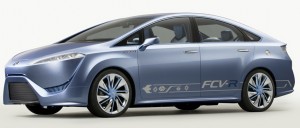Toyota hopes that it can generate some interest in its planned hydrogen fuel cell car by ensuring the vehicle will deliver range comparable to that of a conventional gasoline vehicle – which means the zero-emissions vehicle will be able to travel about 300 miles between fill-ups.
The Japanese maker has said relatively little beyond confirming plans to go to market with a hydrogen car during the 2015 model-year. It is now suggesting that the price tag will be somewhere between $50,000 and $100,000, comparable to something between a midsize BMW and a Tesla Model S, according to the Bloomberg news service.
The production model is expected to draw influence from the FCV-R concept unveiled at the Tokyo Motor Show in 2011, and a more production-ready version is expected to be revealed during the next Tokyo show, this coming November.
The maker is discussing its broad environmental plans, including the use of hydrogen, during the 2013 Aspen Ideas Festival that runs through this week, a release from the maker noting, “Toyota, which has put more than 5 million hybrid vehicles on the road around the world since 1997, has set hydrogen fuel cell vehicles as a key research and development priority for the company. It has committed to introducing a zero-emission hydrogen fuel cell sedan by 2015.
A running prototype, the Advanced Fuel Cell Vehicle, part of a fleet of 100 in a nationwide demonstration program, is on-site at the Aspen festival.
Hydrogen became the darling of the auto industry during the 1990s and early part of the new Millennium due to the fact that it can be burned in a conventional engine or fed into a fuel cell stack and produce virtually no exhaust emissions other than water vapor. There proved to be a number of downsides, however. For one thing, fuel cell technology is expensive. But the real concern is the lack of a hydrogen production and distribution infrastructure.
(Audi is developing a hydrogen-powered version of its A7. Click Here for more.)
But with battery power also proving to be more problematic than proponents had hoped, there’s been a renewed focus on hydrogen. A number of makers, including not only Toyota but General Motors and Mercedes-Benz, are also running demonstration fleets in California, Hawaii and other parts of the world. Honda, meanwhile, has leased a handful of its own fuel-cell vehicles to consumers in Southern California, where a small number of hydrogen pumps are available.
The Obama Administration initially pulled funding away from hydrogen to support battery research but some money is now being restored to the program. Germany, meanwhile, has approved an ambitious project that would establish a network of alternative power stations – offering both hydrogen pumps and high-speed battery chargers – across the country.
A growing number of makers have established partnerships aimed at speeding up fuel cell technology development while also spreading out the cost. Toyota’s program is reportedly one of the industry’s more ambitious.
(Aston Martin will race hydrogen-powered version of its Rapide. Click Here.)
Chris Hostetter, Toyota USA’s group vice president of strategic planning, told reporters the production model will cost in the neighborhood of $50,000, notes Autoblog, “depending on how big your neighborhood is.”
Toyota is expected to offer the production version of the FCV-R in relatively limited numbers and likely make the hydrogen vehicle available only in a few select markets, such as California, where the lightweight gas is reasonably available. The other advantage would be that such a car would count as one of the zero-emissions vehicles that California regulators have now mandated.
(Obama wants $2 billion for advanced vehicle research trust fund. Click Here for that story.)



300 miles would be sufficient but the price and the ability to actually refuel are serious issues for this planned model.